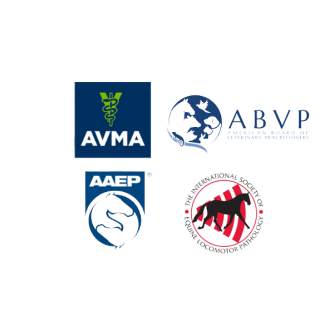Northwest Equine Veterinary Associates
What is an ultrasound?
Ultrasounds are a diagnostic procedure that can be used to locate many different problems. Humans most commonly have ultrasounds to check on the health and progress of an unborn baby still in the womb, but ultrasounds can also be used in humans to monitor kidney health, gallbladder problems, and much more. Although human medical practitioners commonly use ultrasounds for a wide variety of purposes, they are also fairly common in the veterinary world and in equine health, too.
Ultrasounds use sound waves to help technicians and veterinarians see clearer pictures of the inside of the patient’s body. These sound waves bounce off of tissue within the body and create pictures that can be viewed on a screen by the person performing the ultrasound. The pictures are in black and white and may not look very clear to untrained eyes, but the technician knows how to read them and recognize any potential issues. If they see something concerning but inconclusive, however, they may refer the patient to another type of diagnostic procedure for more of an in-depth look.
Most ultrasound machines are small enough that they can be taken to on-site diagnosis appointments rather than requiring the horse to come into the clinic for the procedure. An equine veterinarian will almost always bring the ultrasound machine to you and your horse, which can reduce stress in your horse and remain convenient for you. Results should be available immediately or very quickly after the procedure. Ultrasounds are completely non-invasive and can sometimes be performed without sedating the horse, depending on the location of the problem and the temperament of the horse in question.
How is ultrasound used for horses?
When you think of ultrasound—in any animal or in humans—you probably think of pregnancy. Ultrasounds in horses are no different, and they are most commonly used to monitor the progress of a developing foal before it is born. They can also be used to check a mare’s cycle and may be used in diagnosing reproductive health issues or solving problems with a mare’s reproduction as well.
However, there are some other applications for equine ultrasounds as well. This diagnostic tool is becoming more and more popular with veterinarians looking for portable solutions for locating problems related to the following:
Fluid in the chest
When a horse develops pneumonia or heart conditions that can lead to fluid in the chest, veterinarians may use an ultrasound to diagnose the problem. This issue may require other diagnostic criteria as well, depending on the situation.
Intestinal problems
Intestinal issues are very common in horses. Colic may be caused by a twisted intestine or a ruptured intestine, both of which can be diagnosed by ultrasound. Ultrasounds can also be used to diagnose colitis and enteritis and maybe the only diagnostic tool required for these problems.
Tendon or ligament issues
Horses with torn or damaged ligaments or tendons, or with foreign bodies present in the ligament or tendon, may be diagnosed using ultrasound. The ultrasound can help the veterinarian see the ligament or tendon clearly and recognize any potential issues or problem areas of concern.
Masses
Some masses can be diagnosed using only ultrasound, while others will require ultrasound along with other types of diagnostic tools to fully figure out the problem. Abscesses and tumors may both receive ultrasounds, and horses with suspected masses in certain areas may also receive ultrasounds in order to fully diagnose and locate the problem before further examination.
Now that you’ve had the chance to learn more about equine ultrasounds, you may feel like you understand your horse’s situation fully. However, you may also still have questions, and that’s okay, too! If you do, be sure to ask your veterinarian or the ultrasound technician everything you want to know about the procedure so you can fully understand what’s going on with your horse.
An ultrasound is not an invasive procedure at all, and it can be a useful diagnostic tool to help your veterinarian figure out what might be wrong with your horse. If your veterinarian feels it is necessary for your horse to have an ultrasound, it’s a good idea to go ahead with the procedure if possible.

